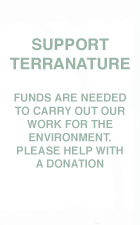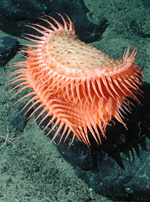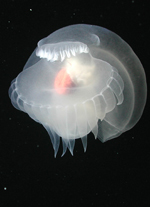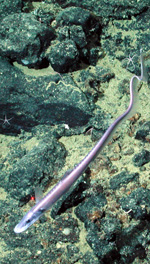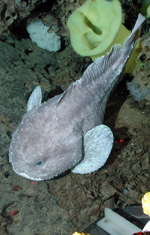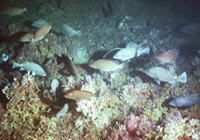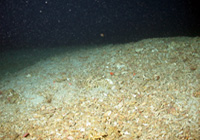|
|

|
|
|
|
Countries work towards a worldwide moratorium on bottom trawling at the United Nations
22 June 2006
Worldwide discussion on high seas bottom trawling is reaching maturity, and the issue is expected to receive significant attention at the UN General Assembly negotiations in November.
A growing number of countries are now saying a moratorium on bottom trawling is needed throughout the high seas.
A number of United Nations processes have been calling for action to stop destructive fishing practices, for some time.
The UN Task Force on Environmental Sustainability of the Millennium Project called for urgent action, with a report in 2005
stating that "global fisheries authorities must agree to eliminate bottom trawling on the high seas by 2006 ... an immediate moratorium would prevent irreversible destruction on the high seas and provide more time to fully assess deepsea fisheries, biodiversity, and ecosystems ... and adopt and implement protection laws".
The UN Open-Ended Informal Consultative Process on Oceans and the Law of the Sea (UNICPOLOS) in June 2005 reconfirmed the call for urgent action to stop bottom trawl fishing damage to vulnerable deepsea ecosystems made by the UN General Assembly
in 2004, and recommended accelerated implementation. |
| |
| |
| |
The New Zealand government says it would support a global moratorium on bottom trawling if there was sufficient international support to make such a moratorium practical and enforceable. Fisheries Minister Jim Anderton says there is no such international consensus at this time, nor is one likely in the future. |
| |
| |
| |
New Zealand came under intense criticism for damage caused by bottom trawling in the high seas at the June 2004
UNICPOLOS meeting.
At the UNICPOLOS meeting in June 2006 it was decided to suggest that the General Assembly (UNGA) propose that implementation of an ecosystem approach could be achieved through advancement of the Plan of Implementation of the World Summit on Sustainable Development, including "the elimination of destructive fishing practices".
Many countries emphasized the need to effectively address the threat to marine ecosystems from bottom trawling throughout the UNICPOLOS meeting. |
| |
|
| |
|
Chile, a leading nation with New Zealand and Australia in forming the South Pacific RFMO, made the statement "taking into account the lack of regulations on the high seas ... States must be encouraged to refrain from authorizing their nationals to conduct fishing activities using destructive practices, including bottom trawling". Norway made a similar statement.
In addressing the UN Fish Stocks Agreement Review Conference in May 2006 in New York, Brazil said "As regards the question of high seas bottom trawling, Brazil supports a moratorium of such activity in high seas beyond national jurisdiction".
The Pacific Islands Forum stated to the UNGA Debate on Oceans and Fisheries "We are well aware of, and firmly support, the need to take urgent action to prevent and manage the effects of destructive fishing practices, including bottom trawling, that has adverse impacts on vulnerable marine ecosystems. We are seriously concerned about the destruction caused by these activities".
The bottom trawling nations, Australia and New Zealand, which are members of the Pacific Islands Forum have not spoken in
support of the PIF statements.
A Pacific nation takes a forthright position .....
Palau, one of the first nations to call for a ban on bottom trawling, spoke at UNICPOLOS in June 2006 in support of an interim measure of a moratorium.
Palau's Ambassador Stuart Beck said "There is of course much that we do not know about marine ecosystems and human activities in them, particularly in the frontier of international waters. But lack of knowledge cannot be an excuse for inaction. This is what precaution is all about".
"Palau learned a bitter lesson during its massive coral bleaching caused by the 1998 El Nino about our vulnerability to carbon emissions and global warming worldwide. This is a lesson about connectivity and how actions in another part of the world can affect even the most remote corners of the Earth. This interconnectedness is why Palau is taking a leadership position on bottom trawling - a practice that poses an object lesson in flouting the ecosystem approach".
"Bottom trawling is widely recognized as the most destructive and indiscriminate fishing practice known to mankind - for just a few fish destined for niche markets, trawlers raze associated coral, sponge, and other flora and fauna. And, as more and more countries close their national waters to bottom trawlers, these vessels are being pushed more and more often into international waters, destroying whole ecosystems before scientists even have a chance to learn about them".
"The Pacific leaders have expressed their "serious concern" about bottom trawling and have agreed to develop an "appropriate legal framework" for addressing it this year".
Palau's proposal is similar to the UNGA consensus on driftnet fishing which is backed by an international treaty. In areas without a competent RFMO, including the Pacific, there should be an interim prohibition on bottom trawling until an RFMO is established and institutes effective conservation and management measures in accordance with the precautionary principle and ecosystem approach. In areas with a competent RFMO, the proposal would allow the RFMO some time to institute effective measures on its own. |
| |
|
|
| |
| |
| |
|
|
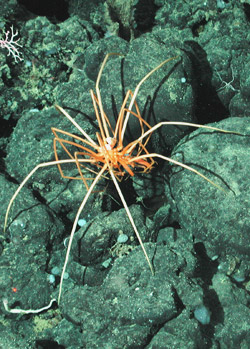
|
There is always the inevitable argument that there is insufficient science to support action. Japan said at
the UNICPOLOS meeting that it could not support the interim measure of a high seas bottom trawling moratorium without scientific evidence establishing that it solves the problem.
The Natural Resources Defense Council (NRDC) said that many governments, including the United States, Norway, Brazil, and
the EU, as well as the Commission for the Conservation of Antarctic Marine Living Resources (CCAMLR) and the General Fisheries Council of the Mediterranean, are taking action within their jurisdictions because of the science.
The National Marine Fisheries Service (NMFS) of the US National Oceanographic and Atmospheric Administration (NOAA) is proceeding
with the designation of the Aleutian Islands Habitat Conservation Area, in the North Pacific. It will be the largest marine
protected area in United States waters, that will prohibit bottom trawling in an area exceeding 274,000 square nautical miles (940,000 sq.km).
The United States has established the Northwestern Hawaiian Islands marine protected area. It is currently the world's largest MPA, covering 84 million acres (340,000 sq.km), containing a series of islands and seamounts that have the most intact tropical
marine ecosystems in the United States.
Also in the United States, the Pacific Fisheries Management Council has recommended closure to bottom trawling, of 82 percent of the US EEZ off the coasts of California, Oregon and Washington.
The European Union adopted a ban on bottom trawling throughout the entire EEZ encompassing the Azores, Madeira and Canary Islands.
|
| |
| |
| |
"The EU views that evidence of actual destruction of ecosystems is overwhelming and that
we know sufficient about growing human pressure on marine biodiversity in areas beyond national jurisdiction to warrant taking
further steps ..." |
| |
| |
| |
The EU will have a significant influence on an UNGA agreement, because many nations are represented under one collective position. In 2004 a bottom trawling ban was opposed by the EU, partly because of Spain, the world's largest bottom trawling country.
But in 2006 the EU position is changing, with a call for strong precautionary measures.
When speaking to the UN General Assembly working group on biodiversity in February, Dr Gerhard Hafner, head of the EU delegation said "the EU has come to this meeting with the clearly felt sense of urgency to address international cooperation on the conservation and sustainable use of marine biodiversity ..."
Dr Hafner said "The EU views that evidence of actual destruction of ecosystems is overwhelming and that we know sufficient about growing human pressure on marine biodiversity in areas beyond national jurisdiction to warrant taking further steps on international cooperation and coordination for its conservation and sustainable use ... on the basis of the precautionary principle and on the basis of the current status of science - we have to act on both the implementation and governance gaps. We have a very impressive and authoritative basis to warrant those actions".
In a November 2005 statement, France has called for a moratorium on all deepsea fishing in locations outside RFMO jurisdiction. Other EU countries, including Austria, Belgium, The Netherlands, Denmark, Sweden, Germany and the United Kingdom have also called for a ban in areas outside RFMOs as a minimum.
At UNICPOLOS in June 2006, the G77 and China said "... the position of the G77 and China, taking into account the need to preserve the marine environment for the benefit of future and present generations, as well as the commitment by the global community to ensure a more equitable sharing of the benefits of exploitation of resources from the deepsea, is that we must deal with this issue definitively during the 61st session of the General Assembly ..."
|
| |
 |
|












 NZ government’s stance on bottom trawling in international waters is weak and
ineffective .....TAKE ACTION
NZ government’s stance on bottom trawling in international waters is weak and
ineffective .....TAKE ACTION

